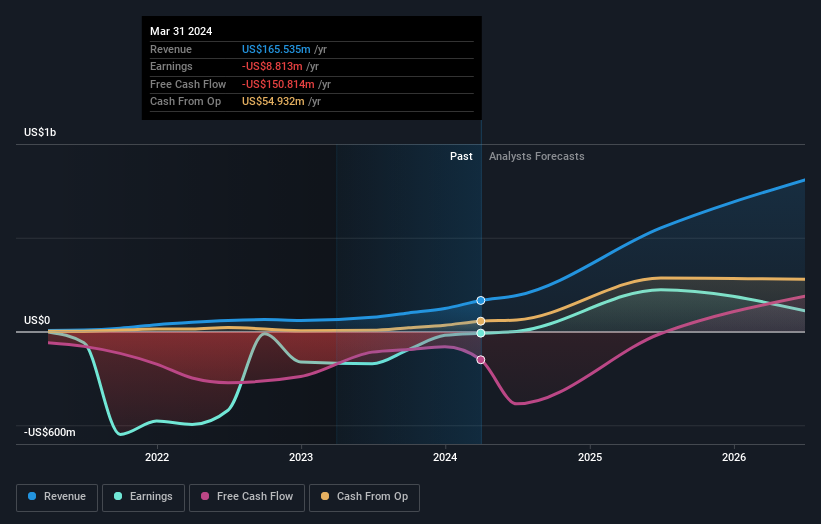- United States
- /
- Software
- /
- NasdaqGS:IREN
Individual investors who hold 53% of Iris Energy Limited (NASDAQ:IREN) gained 6.1%, institutions profited as well

Key Insights
- The considerable ownership by individual investors in Iris Energy indicates that they collectively have a greater say in management and business strategy
- The top 25 shareholders own 36% of the company
- Institutional ownership in Iris Energy is 40%
Every investor in Iris Energy Limited (NASDAQ:IREN) should be aware of the most powerful shareholder groups. With 53% stake, individual investors possess the maximum shares in the company. In other words, the group stands to gain the most (or lose the most) from their investment into the company.
While individual investors were the group that benefitted the most from last week’s US$86m market cap gain, institutions too had a 40% share in those profits.
Let's delve deeper into each type of owner of Iris Energy, beginning with the chart below.
View our latest analysis for Iris Energy

What Does The Institutional Ownership Tell Us About Iris Energy?
Many institutions measure their performance against an index that approximates the local market. So they usually pay more attention to companies that are included in major indices.
As you can see, institutional investors have a fair amount of stake in Iris Energy. This suggests some credibility amongst professional investors. But we can't rely on that fact alone since institutions make bad investments sometimes, just like everyone does. If multiple institutions change their view on a stock at the same time, you could see the share price drop fast. It's therefore worth looking at Iris Energy's earnings history below. Of course, the future is what really matters.

Iris Energy is not owned by hedge funds. Castle Hook Partners LP is currently the largest shareholder, with 3.7% of shares outstanding. For context, the second largest shareholder holds about 2.9% of the shares outstanding, followed by an ownership of 2.1% by the third-largest shareholder. William Roberts, who is the third-largest shareholder, also happens to hold the title of Member of the Board of Directors.
Our studies suggest that the top 25 shareholders collectively control less than half of the company's shares, meaning that the company's shares are widely disseminated and there is no dominant shareholder.
Researching institutional ownership is a good way to gauge and filter a stock's expected performance. The same can be achieved by studying analyst sentiments. There are a reasonable number of analysts covering the stock, so it might be useful to find out their aggregate view on the future.
Insider Ownership Of Iris Energy
While the precise definition of an insider can be subjective, almost everyone considers board members to be insiders. The company management answer to the board and the latter should represent the interests of shareholders. Notably, sometimes top-level managers are on the board themselves.
I generally consider insider ownership to be a good thing. However, on some occasions it makes it more difficult for other shareholders to hold the board accountable for decisions.
We can report that insiders do own shares in Iris Energy Limited. It is a pretty big company, so it is generally a positive to see some potentially meaningful alignment. In this case, they own around US$100m worth of shares (at current prices). Most would say this shows alignment of interests between shareholders and the board. Still, it might be worth checking if those insiders have been selling.
General Public Ownership
The general public, mostly comprising of individual investors, collectively holds 53% of Iris Energy shares. This size of ownership gives investors from the general public some collective power. They can and probably do influence decisions on executive compensation, dividend policies and proposed business acquisitions.
Next Steps:
It's always worth thinking about the different groups who own shares in a company. But to understand Iris Energy better, we need to consider many other factors. Be aware that Iris Energy is showing 2 warning signs in our investment analysis , you should know about...
If you are like me, you may want to think about whether this company will grow or shrink. Luckily, you can check this free report showing analyst forecasts for its future.
NB: Figures in this article are calculated using data from the last twelve months, which refer to the 12-month period ending on the last date of the month the financial statement is dated. This may not be consistent with full year annual report figures.
New: AI Stock Screener & Alerts
Our new AI Stock Screener scans the market every day to uncover opportunities.
• Dividend Powerhouses (3%+ Yield)
• Undervalued Small Caps with Insider Buying
• High growth Tech and AI Companies
Or build your own from over 50 metrics.
Have feedback on this article? Concerned about the content? Get in touch with us directly. Alternatively, email editorial-team (at) simplywallst.com.
This article by Simply Wall St is general in nature. We provide commentary based on historical data and analyst forecasts only using an unbiased methodology and our articles are not intended to be financial advice. It does not constitute a recommendation to buy or sell any stock, and does not take account of your objectives, or your financial situation. We aim to bring you long-term focused analysis driven by fundamental data. Note that our analysis may not factor in the latest price-sensitive company announcements or qualitative material. Simply Wall St has no position in any stocks mentioned.
About NasdaqGS:IREN
High growth potential with adequate balance sheet.
Similar Companies
Market Insights
Community Narratives



